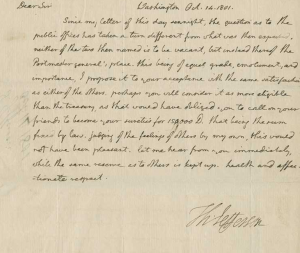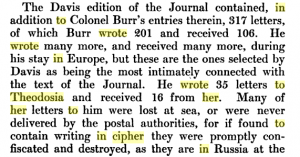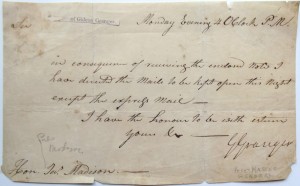Gideon Granger, a Postmaster General with an Intelligence Gathering Mission
July 24, 2013 in American History, general history

Gideon Granger (wikipedia)
Gideon Granger received his appointment as Postmaster General from the newly elected president,Thomas Jefferson, in 1801. Because Granger had been instrumental in helping Jefferson obtain the office of President in a highly contested and extremely confusing election — his running mate Aaron Burr very nearly beat him to the presidency — Jefferson was very much beholden to Granger. It was understood between the two of them that some very high office would be awarded to Granger as a reward for his services, but which office exactly it was not immediately clear.
Here is a copy of the letter that Thomas Jefferson wrote Granger offering the job with the United States Postal Service, reproduced here from the Raab Collection.

A facsimile of the original letter from Jefferson offering Granger the job (from the Rabb Collection)
The letter is dated October 12, 1801. Jefferson writes: “Since my letter of this day sevennight [sic], the question as to the public office has taken a turn different from what was then expressed. Neither of the two then named is to be vacant, but instead thereof the Postmaster general’s place, this being of equal grade, emolument and importance. I propose it to your acceptance with the same satisfaction as either of the others. Perhaps you will consider it as more eligible than the treasury, as that would have obliged you to call on your friends to become your sureties for of 150,000 D, that being the sum fixed by law. Judging the feelings of others by my own, this would not have been pleasant. Let me hear from you immediately while the same reserve as to others is kept up.” Jefferson closes with “affectionate respect.”
Gideon Granger served as Postmaster General from November 28, 1801 to March 17, 1814. He was still the Postmaster General during most of James Madison’s presidency. Here is a letter from Gideon Granger to President James Madison from 1811.
Granger writes: “in consequence of receiving the enclosed note I have diverted the mails to be kept open this night, except the express mail — “.
What were the duties of the Postmaster General during the tenure of Gideon Granger? When was it all right to divert the mail, express or otherwise? What sorts of direct communication between the President and the Postmaster General concerning the mail, its delivery and its content would have been appropriate? Was intelligence gathering part of the mission of the Postmaster General’s Office?
The historian Henry Adams had this to say about Gideon Granger: “…the most active politician was Gideon Granger, the Postmaster-General, whose ‘intimacy with some of those in the secret,’ as Jefferson afterward testified, gave him ‘opportunities of searching into their proceedings.’ Every day during this period Granger made a confidential report to the President ”
Granger had Jefferson’s ear, and when he wanted to be appointed to the Supreme Court in 1809, Jefferson wrote to the then current president, James Madison, in support of Granger’s bid for that high judicial office. Madison did not accede to this suggestion, and instead he appointed Joseph Story, even though Story had not supported the Embargo Act sponsored by Jefferson.
Historian Roger Kennedy writes: “Granger remained Postmaster General but went into skulking opposition to Madison. There is strong evidence that he conspired with Clinton to replace the president in 1812, but until 1814 Madison still deferred to Jefferson’s expressed confidence in Granger. In that year .. the Postmaster went into outright revolt, appointing Madison’s political enemies to lucrative postmasterships. Madison had had enough and threatened to fire him. Granger turned … to blackmail. First he attempted to terrify Madison himself with disclosures about his wife. While Dolley Madison was a widow under reduced circumstances, Burr may have been only a friend, but , Granger let it be known, others had been more than friends, and he had letters to prove it.” (Kennedy 276).
Eventually Madison dismissed Granger, and the Postmaster ended his days as a country squire. However, for twelve years the United States Postal Service was presided over by a blackmailer, a letter opener and a government spy. What effect did this have on the correspondence between and among citizens?
One thing that people did was to write in cipher. These ciphers were often simple substitutions and not as sophisticated as today’s encryption. But such attempts to deal with government surveillance of private communication were sometimes met with countermeasures from the US government and by other governments. Sometimes when a letter was opened and found to be in cipher, it was simply not delivered.

An Excerpt from the Google Books version of Charles Felton Pidgin’s “Theodosia: The First Gentlewoman of her time”
Corruption begets corruption. A system of rewards of public office for political allies can have a lasting effect on the communication and morale of an entire nation, and this can lead to disastrous results both in times of peace and during war.
REFERENCES
Adams, Henry.
Kennedy, Roger G.
Pidgin, Chares Felton.
Suggested Reading
If you are interested in reading a fictional account of how Gideon Granger’s postmastership inhibited communication during the war of 1812, try this book:

Recent Comments